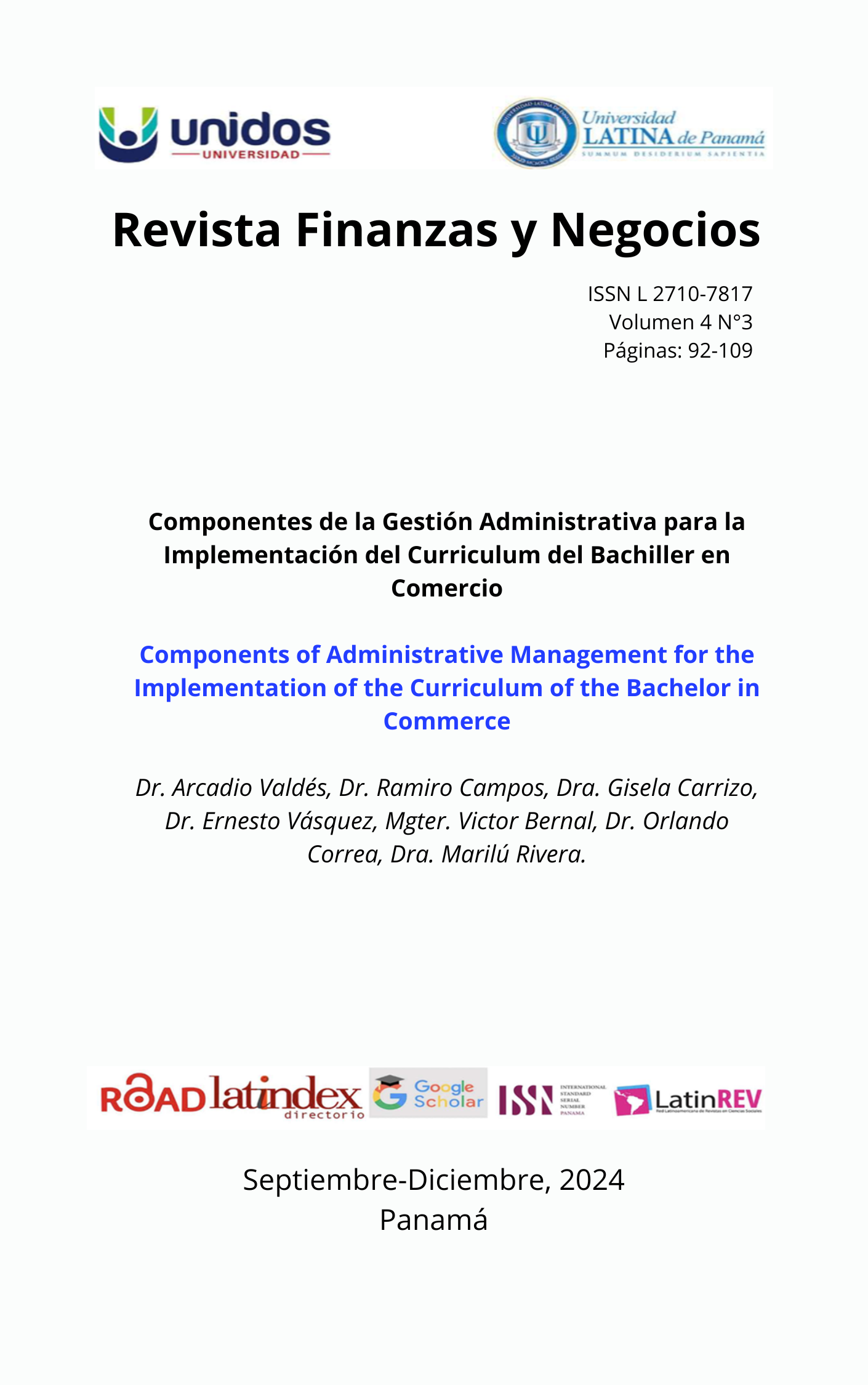Components of Administrative Management for the Implementation of the Curriculum of the Bachelor in Commerce
Keywords:
components, administrative management, curriculum, education, commerceAbstract
In this research, the general objective was to describe the components of administrative management for the implementation of the curriculum of the bachelor in commerce. It was argued with the theories of the components of administrative management according to; Mateo (2006), Stufflebeam and Shinkfield, (2007). For the methodology, it was proposed, with the type of descriptive research with a design; documentary field and bibliographic population was made up of 80 subjects and the sample of 45 subjects, students, teachers and parents, a questionnaire validated by five expert doctors in education was used, the reliability of the instrument was obtained obtaining 0.80 of very high magnitude according to the Cronbach's Alpha coefficient, the Spss Statistic version 18.0 was used which allowed the information to be captured in tables and double entry graphs by: variables, dimensions and indicators represented in percentages. It is concluded; Never and sometimes, the director manages the development of the curricular planning: forming work teams to turn the educational institution into a center of pedagogical excellence. Almost never and never, the director; carries out the administrative curricular management by diagnosing the internal and external elements of the environment for the implementation of the curriculum. Almost never and never, the director; allows to specify the mission, the vision, the profile of the student, the values called the institutional horizon from the assessed needs. Never and almost never, the director; administratively manages: the quality that will guide the various curricular actions through the training purposes by levels with the criteria for the distribution of educational time.
Downloads
References
Ander-Egg,E (2020) Niveles Del Curriculum. SciEL versión impresa ISSN 2519-7320versión On-line
ISSN 1990-8644
Arispe, C. y otros. (2020) La investigación Científica. Una aproximación para los estudios de postgrado.
Primera edición. Universidad Internacional del Ecuador.
Cortes, M. e Iglesias, M. (2004) Generalidades sobre Metodología de la Investigación. Universidad
Autónoma del Carmen Av. Concordia. Primera edición. México. Colección Material Didáctico.
Diez, E. (2001) Administración y Dirección. España: Mc Graw Hill.
Face, P. (2011) Cuando la escuela pretende preparar para la vida: ¿desarrollar competencias o enseñar
otros saberes? Barcelona, España: Graó.
Freire, P. (2014) Elementos de la situación educativa. En Autor, El grito manso. 2.ª edición. Buenos Aires,
Argentina: Siglo XXI.
García. C. y Vargas. J. (2020) Gestión curricular en tiempos de crisis: un escenario fenomenológico
disruptivo CIEG, Revista Arbitrada del Centro de Investigación y Estudios Gerenciales (Barquisimeto - Venezuela).
González, M. (2000) Administración escolar. México: Castillo.
Graffe, G. (2002) Gestión educativa para la transformación de la escuela. Revista de Pedagogía
Escuela de Educación Universidad Central de Venezuela, versión impresa ISSN 0798-9792
Hernández, R. Fernández, C. y Baptista, P. (2014) Metodología de la Investigación. Sexta Edición.
Mc Graw Hill Education.
Lepeley, M. (2001) Gestión y calidad en educación. Chile: Mc Graw Hill.
Mateo, D. (2006) Gestión Emprendedora. Estrategias y Habilidades para el emprendedor actual: España.
Muñoz, C. (2015) Metodología de la investigación. Ciencias Sociales Primera edición. México.
Rangel, J. (2015) La educación encierra un tesoro: informe a la Unesco de la Comisión internacional
sobre la educación para el siglo XXI. Madrid, España
Ruetter, I. y Conde, M. (2005) Supervisión educativa: Gerencia y Pedagogía. Caracas: FEDUPEL.
Stufflebeam, D. L. & Shinkfield, J. (2007) CIPP Model for Evaluation: An improvement accountability
approach. Evaluation theory, models, and applications. (pp. 325-365). San Francisco, EE. UU.: Jossey-Bass.

Downloads
Published
How to Cite
Issue
Section
License
Copyright (c) 2024 Attribution 4.0 International (CC BY 4.0)

This work is licensed under a Creative Commons Attribution-NonCommercial-ShareAlike 4.0 International License.
El contenido de las publicaciones son responsabilidad absoluta de los autores y no de la Universidad ni de la revista Finanzas y Negocios, que es editada por la Universidad UNIDOS. La revista permite a los autores mantener el derecho de autor sobre los articulos y documentos publicados mediante el uso de la siguiente licencia.
Los artículos se publican con una licencia https://creativecommons.org/licenses/by-nc-sa/4.0/deed.es
Bajo los siguientes términos:
-
Atribución — Usted debe dar crédito de manera adecuada, brindar un enlace a la licencia, e indicar si se han realizado cambios. Puede hacerlo en cualquier forma razonable, pero no de forma tal que sugiera que usted o su uso tienen el apoyo de la licenciante.
-
NoComercial — Usted no puede hacer uso del material con propósitos comerciales.
-
CompartirIgual — Si remezcla, transforma o crea a partir del material, debe distribuir su contribución bajo la misma licencia del original.

